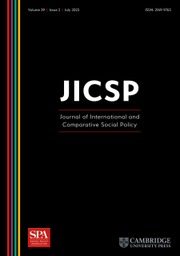Article contents
Can Latin America learn from India’s efforts at fighting poverty? The case of the Mahatma Gandhi National Rural Employment Guarantee Act
Published online by Cambridge University Press: 17 March 2020
Abstract
A decade of high economic growth (2003–2013) in Latin America accompanied with high social spending, produced a significant improvement in the living conditions of the region’s population. Household incomes grew, poverty and inequality rates fell, and job opportunities increased. However, beginning in 2013 the economic situation of Latin America experienced a downwards trend. The effects have been felt in reduced income due to the fewer labour opportunities afforded by a decrease in demand and investment, particularly in infrastructure. Moreover, investment in infrastructure has remained stagnant since the late 1990s. The present article is intended as a preliminary study regarding the feasibility of transferring the National Rural Employment Guarantee Act to the Latin American region. The paper contends that such a policy transfer could greatly improve the adverse employment conditions affecting large segments of the Latin American rural workforce and contribute to bridge the area’s rural-urban infrastructure gap.
- Type
- Research Article
- Information
- Journal of International and Comparative Social Policy , Volume 36 , Issue 2 , July 2020 , pp. 159 - 174
- Copyright
- © The Author(s), 2020. Published by Cambridge University Press on behalf of Social Policy Association
References
- 2
- Cited by


